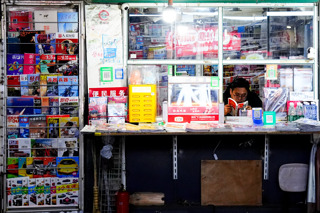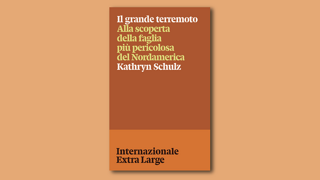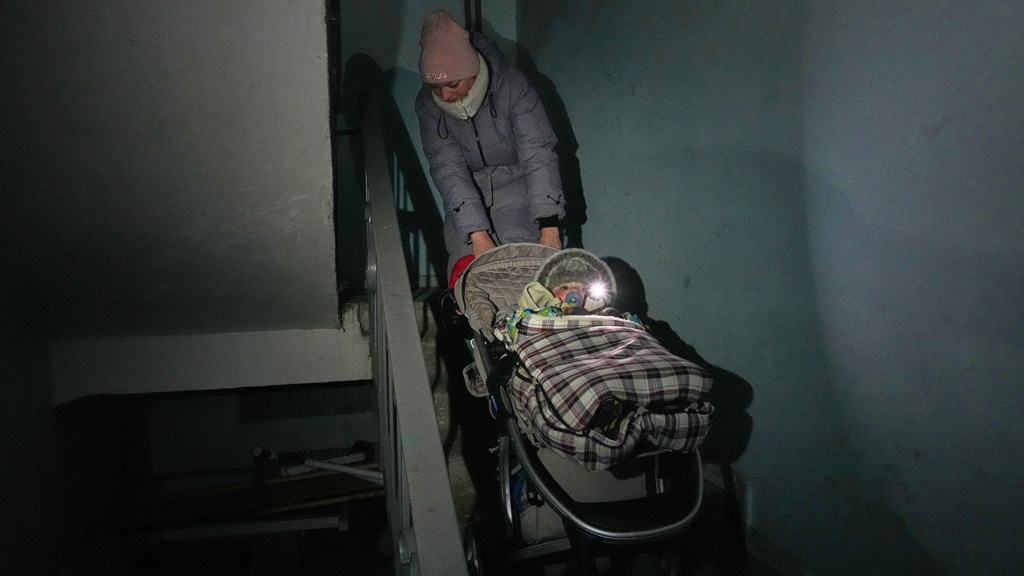A black hand reaches under Angela Merkel’s legs, sheathed in white stockings, and gropes at her genitals; the upper part of her body is still covered in one of her famous colourful jackets, but now – this picture tries to tell us – the Empress has no clothes, having been exposed by the black man’s intrusive molestation. Such was the cartoon published in the Süddeutsche Zeitung,commenting on the events in Cologne. Faced with the sexism of the ‘black men’ molesting ‘white women’ on New Year’s Eve, ‘white men’ responded with the same sexism, directed against their own Chancellor.
Certainly this response is an obscene one – and yet its extremism is also very telling. Maybe Michel Houellebecq was right with his similarly misogynist Submission? Scratch the surface of European males’ hatred toward the Islamic invader, and you will find envy. Envy of the submission of women that the invaders – unlike the invaded – can still enjoy. This envy is the exact mirror-image of the invaders’ envy of the female sexual freedom available to the invaded – an envy that can easily be detected in the ‘desire for the West’ that drove the attackers in Cologne that night to copy – in their own, violent way – the heady, boozy enjoyment that drives so many wild in this and countless other European cities on New Year’s Eve.
Since 9/11, when we saw the Hollywood spectacle of the two planes penetrating the Twin Towers and violating Manhattan (and here too, note the rape metaphor) we should have understood once and for all that if these acts of violence and terror are interpreted in the West as if they came from another planet, they are imbued with traces, techniques, customs and usages that do come from our own world. This is not just the return of the tribe, such as some said we could see coming back into force in Cologne. The ‘superiority’ of the West dies hard, and if it no longer orders the real world, it does still lay down the law in the global imaginary. The ‘others’ see themselves in its mirror, even when they commit violence against it.
The facts
As we know, spectres are truly at home in the game of mirrors. Perhaps it is for this reason that they took on form and substance on the square in Cologne quicker than the real facts did. One month on, there is still rather a lot of fog over the facts themselves. We know the fundamentals of what happened that night, but we do not know some of the major details, and probably never will do. A crowd of young men, perhaps 500 or 1,000, ‘of Arab and North African appearance’, massing drunk inside the station, headed in gangs to the Cathedral square, robbing, harassing and seriously assaulting a hundred-odd mostly German white women, who were either alone or with male or female friends or in groups, while the police remained wholly passive, standing watching without realising what was happening, and in any case being unable to stop it.
Reconstructions of these events based on the women’s testimony and the police’s own reports describe the thieving and molestation these women suffered in some detail; some of the victims report having feared for their lives. Yet there are still a lot of holes. Who were these men, where did they come from, how did they arrive, and why were they allowed to amass in the station? If they were all ‘of Arab and North-African appearance’, how come the 31 men arrested for assault and robbery also included an American and three Germans? Were they, too, North-African ex-pats in the USA and Germany, or does their presence suggest that we have to go beyond identifying these men based on their skin colour? 19 of the 31 arrested men were asylum-seekers, and of these just one is suspected of molesting someone; moreover, according to one witness referred to in the New York Times, that night a female American tourist was saved by a defence-line formed by Syrian asylum-seekers; some days later, several hundred Syrian refugees themselves demonstrated against violence, racism and sexism. Do these numbers justify the fingers now being pointed against Merkel’s refugees policy?
There’s more. Although the police were on alert against the threat of attacks, they proved wholly impotent in containing and dispersing the mass of attackers, and maintained a four-day silence over what had happened, as did the German public broadcaster. Does this impotence and this silence owe to a pro-migrant, ‘politically-correct’ prudery, as some have proclaimed in both Germany and Italy – or rather, to the little consideration for sexual violence in a country in which one women in three has suffered such violence (from men who are 70% German, and not Arabs) and in which a blind eye is turned to such groping on New Year’s Eve, much as it is during Oktoberfest?
Last but not least, similar violence took place that same night in other German cities as well as in Sweden, Finland and Austria, which might legitimately lead us to suspect that this was a concerted provocation. At some point this suspicion became a certainty, sprawling across the front pages of the German and Italian newspapers, before being forgotten the following day. Is it possible that the powerful means of German and European intelligence were unable to check this suspicion either way, however crucial this was to evaluating what had really happened? Again: were the attacks minimised in an attempt to placate Merkel’s integration policy, as right-wing opinion has it? Or because, as we might legitimately suggest, they were considered bagatelles pour dames?
Spectres
We will never have the answer to these questions, for the very simple reason that that night in Cologne had the effect it necessarily must have had, regardless of any detailed reconstruction of the facts. And the effect was a rapid, powerful mobilisation of the European imaginary – as well as the Islamic one – regarding sex and race. When these two factors are interlinked, such as they always appear on the global stage today, they can produce explosive cocktails.
On the Islamic side, we are hopeful that little importance must be attributed to the beliefs of one Cologne imam who claimed that the women in Cologne that night had been asking to be molested, covered as they were in more perfume than clothes. Nonetheless, his ‘extreme’ statements have a lot to say about the Islamic regime of sayable, allowing a purported spiritual leader to institutionalise female segregation (and anyway, should we be so shocked? How many times have we heard ‘she was asking for it’ still being used to justify sexual violence, even in Italy?).
As for the Western side, the old colonial spectre of the black hand violating the black women –as well put on display in the Süddeutsche Zeitung cartoon – has come back again, updated to match the concerns of a Europe obsessed with porous borders, uncontrollable migration, falling birth-rates, the terrorist threat, economic decline, neoliberal impotence and political disarray. In this context, bringing this colonial spectre into the modern day means recruiting it to the ‘clash of civilisations’ that is now supposedly underway. The black man becomes the Muslim who debases women – his own women, and others’, too – and who through his attack on white women attacks all Western society. And this is a Western society that supposedly loves women, emancipates and liberates them, protecting them with rights, with ‘its’ men defending them, ready to take to the field to stand up for ‘their’ women.
What follows from this is the enrolment of women in the defence of Western civilisation – and, related to this, pointing the finger against those women who desert its cause. Namely, those women who do not sign up to defend it; those women who have some doubts over Western civilisation and its love for women; those women who see violence against women in the West, too, and not only in the Middle East; those women who raise concerns over defending ‘their’ men; those who, faced with Muslim women, do not erect the rights they have won or the mountain of clothes they bought in the latest sales as a defensive rampart, but instead try to build the bridge of a common commitment to female freedom.
That is to say, in substance, us feminists, signed up (as a matter of course) to the enemy front of ‘politically correct’ hypocrisy over Islamic fanaticism. Though ironically enough, our accusers had soon to deal with the Italian government’s decision of covering up statues in the Rome city hall as a homage to Iranian president Rouhani visiting the Italian capital last week end.
Witches
‘Where are the feminists?’ When the news from Cologne was still coming in drip by drip, the witch-hunt began. Once the number one guilty party was found – the black man – the media beating the drum (both male and female) set out looking for the number two guilty party – the white feminist. Her crime? Staying silent, hiding away, not condemning, colluding with the migrants and the Left that defends (does it?) the migrants, giving ‘her’ men grief for any little nonsense as if it was barbaric, yet closing her eyes to the vile acts of the ‘true’ barbarians.
Meanwhile in Cologne, the feminists were already in the streets, protesting against both sexism and racism. And everywhere in Europe and beyond they were at work countering the narrative of the talk shows and the mainstream press: understanding a new situation and interpreting it in non-hysterical terms, two things that mass media hysteria cannot contemplate. And they spoke everywhere they could, meaning, outside of the official channels of information that ignored them in order to accuse them of staying silent – being nowhere to be seen, not existing, and having lost. They did speak: and everywhere they said – East and West, North and South – what they have been saying ever since 9/11 – that they will not allow themselves to be enrolled in any clash of civilisations, for the good reason that the civilisations in question are both characterised by patriarchy, both riven by the contradiction between the sexes, and both positively marked by the sex-conflict that women have engaged. The plank in the other person’s eye does not exempt us from looking at the speck in our own. And pride in our conquests as Western women does not exempt us from recognising non-Western women’s battles for freedom.
Monopolies
There is no Islamic monopoly on violence and the subordination of women. And nor is there any Western or democratic monopoly on women’s freedoms.
For all of us, the attacks that night in Cologne evoke very familiar situations. The excited and complicit glares from single men, such as we still find in the bars of our Southern regions. The packs of young men who molest female students, and sometimes rape them, in our schools. The sense of insecurity and vulnerability that especially accompanies us walking through the streets at night, like a second skin. The reports of rapes, violence and, femicides that fill the news pages of our dailies. The male misunderstandings of women’s sexual availability that fill up the advice columns of our weekly magazines. We could go on, but there’s no need: unfortunately, men’s violence against women is one of the few examples of universal behaviour still known to the world. And it does not go away, but even tends to increase in the countries where female emancipation is most established. Male hubris does not bow to constitutionally guaranteed rights, gender parity, citizenship, or women’s working activity and political leadership; on the contrary, these things seem to feed it, perhaps because they instill fear.
This means that there is no automatic relationship – no cause-effect relation – between Western civilisation and women’s freedom. As Freud and Hobbes remind us, Western civilisation and modern states emerged from a pact between violent men, who freed themselves from paternal authority and then shared out its inheritance, excluding women from public life and subjugating them in private life. Over the course of modernity, Western civilisation did not gift freedom to women: it was women who had to conquer it with their own struggles, also and including against Western civilisation.
Contemporary democracies have trouble recognising these conquests, instead translating them into – and often betraying them with – the language of parity and rights. But there is an ongoing tension between women’s freedom and Western social orders: for women’s freedom is reliant, in the first place, on women themselves, on their struggles and their autonomy. It is less possible than ever before to identify women’s freedom with the freedom of the market or with a generic ‘Western lifestyle’, such as an incessant neoliberal ideology in the columns of the main Italian papers seeks to pound into us. Dressing up, or going to the cinema or a club, as you please, are certainly pleasurable things, and we wouldn’t want to give them up; but they can also imply conditions of dependency on the market, on money, on imposed ‘canons’, and the gaze of others who have little to do with the existential freedom and the politics that we have won through feminism. The West is not the Eden of women’s liberty: and it is only by taking this critical position with regard to ‘our own’ civilisation that we can protrude into other worlds, or the impact that other worlds have on our own.
Differences
When we say, or write, these things, some friends of ours reproach us for using patriarchy as a universal, undifferentiated category, ending up lumping together every situation without seeing that the patriarchy is interlinked with different systems of domination; without seeing that it is crystallised in different degrees of women’s oppression of women and male abuse, which in turn demands different strategies for struggle. Yet that is not the case. We are well aware – sadly aware – that today political-religious radicalisation is worsening the lives of women in Islamic countries, giving fresh ideological legitimacy to male domination.
We are well aware that for ISIS and Boko Haram, violence against women has become a ruthless advertisement; that the male frustration at the failed revolution was offloaded on the women of Tahrir Square; and that in countries like the Taliban’s Afghanistan women are subjected anew to a segregation that almost seemed to have been left behind. And we know we are not equal to this and the other effects of today’s global disorder, because wars cut off at the root the practice of relations with the other woman that is fundamental to a women’s politics. However much we cry out with indignation and express our solidarity, we have no substitute for this.
We are likewise well aware that migration does not resolve, but multiplies the problem of relations among the sexes. Today we are burdened with having to demonstrate that we put the defence of women’s freedom above do-gooder positions on accepting migrants. We throw this same question back against those who raise it to attack us. Certainly it wasn’t us who spoke for years about migrants and refugees in the neuter, as if the condition of being a migrant or refugee somehow cancelled out sexual difference. It does not cancel it out, and we didn’t need the events in Cologne to realise that accepting migrants and so-called integration are no dinner party. We didn’t need the events in Cologne to realise that the norms and customs of foreign communities almost always come to blows with our own, and that the difficulties of integration often further ossify them, making the segregation of women within these communities yet harder – to realise that women are always, in peace as in war, the stakes of a social exchange that cultural conflict renders harsh and sometimes even unbearable.
Nor did we need the events in Cologne to realise – for shame – that a policy for accepting migrants that does not take account of sexual difference is a bad policy. Where men-only ghettoes are created, whether Islamic or otherwise, there is always an increased danger of them forming gangs. Where the trafficking of women is organised and tolerated, prostitution and its exploitation are guaranteed. Yet we should also reflect on the fact that the problem of a violent threat to social coexistence comes from the male section of the migrants. It is men, more than women, who react aggressively to the impact of the clash with the receiver country. And it is women more than men – think of the thousands of badanti [care providers in the home] who live and work in Italy, or the women who work in the reception centres or in cultural mediation, or teaching languages to migrants – who take care of life and the relations between different worlds, continuing the female civilising work that male violence hides and undoes.
This, at least, is a piece of good news: and it is not the only one, so long as when we look at what is happening we consider women as active subjects, and not passive objects, of the changes now underway.
A dark choir
It took one night’s attacks in Cologne and the other cities involved to sweep us all along – both Western and North-African women – pigeon-holing us as the designated victims, endangered and losing out from the supposed ‘clash of civilisations’. Yet turning women into ‘victims’ is one of the strategies most frequently used to domesticate them: it serves to hide and depress feminine subjectivity and the social, political and artistic practices in which it is expressed.
Everywhere, today, in a context marked by unprecedented changes, fault-lines, and wars, women are fighting for their own freedom; everywhere they are opening up fronts of conflict with the other sex; everywhere they are breaking out of the schemas imposed upon them; everywhere they are transgressing the normative injunctions governing their existence; everywhere they are establishing relations with women of different backgrounds and cultures. This word ‘everywhere’ applies to the Western societies for the whole last century; and we will note as much to those in the media who take us for dead and defeated whenever they can. But it also goes for today, in the first place, for the Muslim world.
We know as much from the expert yet unlistened-to analysts, who explain to us the differences, the articulations, and the combinations of religious and state law in that world, and the connected differences in women’s condition, their subjectivity, and their revolts. We know as much from the migrants whom we encounter in our everyday activity; from the stories that we hear in the anti-violence centres, to whom the most unfortunate turn in order to find the strength to rebel again a father, a husband or a brother; from the testimonies of war-survivors and the protagonists of revolts. We know as much from women writers, from women artists’ works, from women directors’ films, from women philosophers’ thinking, and from women theologists’ readings of the Quran. And we also know that Muslim women’s path to freedom does not always or necessarily pass by way of their Westernisation – that is, through a secularist emancipation, legally backed up by the syntax of rights and the rhetoric of parity, an emancipation that rebels against the Eastern injunction to veil the women’s body as much as obeys the Western opposed injunction to uncover it.
For this reason, we clearly disassociate ourselves from the dark choir that has accompanied the Cologne events in the Italian and European media. When women’s voices are listened to and not silenced, they recount a far more articulated reality than any supposed generalised regression to the tribal patriarchy of brown, bearded men arriving from the Middle East, whose threatening shadow now extends over European women. This diagnosis has to be turned on its head. There is a generalised crisis of the patriarchy, everywhere – East and West, North and South – losing credit among women. Pace the fantasies à la Houellebecq, the submission of women is no longer guaranteed under the banner of Islam, or that of Christianity or any other religion. And women’s freedom does not only advance through the magnificent, progressive strides of secular democracies.
Globally, the law of the father – which has been a guarantee of symbolic support to political and state orders across modernity – is losing control. This disorder opens up many opportunities for nostalgic, reactionary acts of male violence, but just as many opportunities for constructing practices of women’s freedom and webs of relations among women. These latter practices transgress women’s belonging to this or that civilisation and their respective fetishes, and invent unprecedented forms of politics based on exchange – the conflict and mediation among different experiences, histories, roots and horizons.
Veiled mouths
Listening to the other – her experience, her story, her needs, her desires, her traumas, her resources – is a necessary condition for repairing the pattern of civilisation, and in a direction opposite to that of the clash of civilisations. In this, the racket of the Italian media machine, wholly programmed not to listen but to shout, is no help to us – rather, it is an obstacle.
We have already said that the witch-hunt against feminists that broke out after the Cologne events – accusing the witch of a guilty silence (without having asked what she thought), of connivance with politically correct, pro-migrant hypocrisy, and of using double standards for foreign men and the men back at home. But this problem did not begin with Cologne: this same schema repeats itself, with unbearable monotony, off the back of any event that brings the relations among the sexes into question. The impulse thus released is always the same: the attempt to reduce feminism and feminists to nothing, decreeing that they have lost and distorting or diminishing their positions.
The fundamental futility that characterises a good part of Italian journalism – and not only recently – is even blunter and cruder when feminism is in question. As if this were legitimate when speaking of women; as if these news had no precedents; as if women’s voices counted for nothing; as if feminists’ political and cultural positions had no right to the distinction, analysis and discussion that are reserved to male chatter. And, above all, as if they did not exist autonomously, but only as subaltern appendages to the Left and Right, or in any case, to parties and conflicts that have already been determined somewhere else.
Thus a misogynist imaginary – among both men and women – takes the place of the analysis of reality. And delegitimising feminism itself becomes a far-from secondary stakes of any ‘culture’ war: which is accompanied, it goes without saying, by the promise that ‘our’ men will now take care of defending us from what we ourselves are not up to resisting.
This praxis, so prevalent in the mainstream media, is no less violent than the male hands creeping under the women’s clothes that night in Cologne. And it tells us – again tells us – that whenever the female body is under attack, the real target is women’s voices. For that is the real threat, the target that has to be struck against – here, in the West of freedom of expression, and not over there, in the Middle East of veiled mouths. We have written this text in order to show that this voice is still speaking, and will not let itself be silenced.
(Translation by David Broder)
First signatories: Maria Luisa Boccia, Maria Rosa Cutrufelli, Elettra Deiana, Sara Gandini, Diana Sartori, Tamar Pitch, Chiara Zamboni, Luana Zanella, Edda Billi, Maria Brighi, Paola Mastrangeli, Rosanna Marcodoppido, Marinella Perroni, Ilaria Fraioli, Carlotta Cerquetti, Giovanna Borrello, Sandra Macci, Daniela Dioguardi, Vittoria Tola, Susanna Menichini …
This text came out of a meeting on the Cologne events, held at the Casa Internazionale delle donne in Rome. It will be presented and discussed there in a 14 February 2016 conference (via di San Francesco di Sales 1, sala Carla Lonzi, 10am-3pm). For more information, contact details and reports from the meeting, see www.facebook.com/suglispettridicolonia
Internazionale pubblica ogni settimana una pagina di lettere. Ci piacerebbe sapere cosa pensi di questo articolo. Scrivici a: posta@internazionale.it







